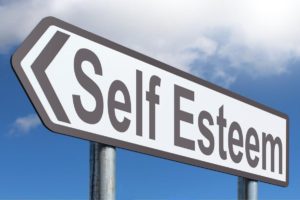 Teenage girl watches men’s soccer on television (pxhere.com).
Teenage girl watches men’s soccer on television (pxhere.com).
In the second quarter of 2018, there were over 130 million Netflix subscribers across the globe (statista.com). From January first to October third of 2018, over 960 million tickets were sold in movie theaters in the United States (boxofficemojo.com). These numbers continue to rise every year. Now more than ever, people are watching films and television. Why? Everyone’s answer to that question may be different, but at the end of the day it boils down to one or two universal truths. We either watch because we care, or because “movies allow us to escape” (Why Do We Watch Movies?, Brett McCracken).
In Philip K. Dick’s science fiction novel, Do Androids Dream of Electric Sheep?, the Earth has been all but abandoned. An unlucky few, and those that were deemed unworthy, still remain. Hollywood and its equivalents no longer exist. Television and films, other than a propaganda fueled talk show by the name of Buster Friendly, are extinct. So in this dystopian future, when people are desperate to find something to care about, or desperate to escape their apocalyptic surroundings, where do they turn? The black empathy box and Mercerism.
This device, the black empathy box, is a machine that immerses you in another space, in another life. You are transported into another being, that of Wilbur Mercer, who, by my interpretation at least, is a Christ-like figure. Mercer is eternally climbing an infinite hill, while unseen villains hurl rocks in his direction. Should one of these rocks connect, all users who happen to be using the black empathy box at that given time, will feel its impact. Upon returning back to their normal lives, outside of the empathy box, the stone’s impact is still felt. There may be bruises, cuts and scrapes. Much like the matrix, from The Matrix, the empathy box makes things very real.
You may be asking yourself, why on Earth would anyone use this machine? Allow me to tell you. Not only are users connected with Wilbur Mercer, they are also all connected with each other. Everyone feels each other’s emotions, thoughts, and pain. Helping others is a core belief of Mercerism, and this can be accomplished through the use of the empathy box. A sad, suffering person can immerse themselves in this world, and instantly be met with thousands of different people experiencing happiness, and in turn these happy people will absorb some of the sadness from the other user. The same experience can be had with all emotions: anger and serenity, doubt and confidence, loathing and love. This is how the black empathy box earned its name. All of its users are able to care for and help one another by experiencing someone else’s life first hand.
Again, escaping your real world, and because you empathize with characters’ situations in film and television, are the main reasons we watch them. Down in the dumps? Watch a comedy to cheer yourself up, or maybe watch something sad in order to relate to someone else and help yourself understand and overcome your sadness. Angry and disappointed with the latest news story or political climate? Escape to the land of Lord of the Rings or Game of Thrones, or the vast, infinite space of Star Wars. Just got home from work? Slap on your favorite television series and see what the character you’ve been watching develop and sharing lives with for the past four years is up to.
Film and television, and all forms of storytelling for that matter, are truly amazing. We as audience members are so invested in, care so much for, and empathize with, people we’ve never met before. People that aren’t even real. Game of Thrones is a great example of this. Everyone that watches it has a favorite character, or a handful, let’s be honest, and the show doesn’t pull any punches. No characters are safe, especially once it gets around season finale territory. People all over the world cry and scream and ache when characters die in the show. The opposite also occurs. When nasty, evil characters get what’s coming to them, people around the globe rejoice and cheer. This is because we empathize with the characters in the show and we don’t want anything bad to happen to them, and vice versa, maybe deep down we want something bad to happen to the people that have wronged them.
Much like the black empathy box does for its users in Do Androids Dream of Electric Sheep?, film and television allow us to connect with other people and share their experiences and emotions. In an article by Léa Surugue entitled, “Reading books and watching films makes you kinder in real life”, she claims that “Identifying with fictional characters in books and films makes us more empathetic in real life”. The ability to empathize is one of the main characteristics of what makes us human. Understanding what other people go through and feeling for them and wanting to help is what brings us together.
In Do Androids Dream of Electric Sheep?, empathy is exactly how Rick Deckard, the protagonist, attempts to separate androids from humans. He does so by administering a verbal test and gauging the recipient’s answers. Androids, who are thought to be incapable of feeling empathy, are supposed to fail this test, while humans should pass it. That being said, Tim Recuber, in his article entitled “What Becomes of Empathy?”, shares a quote by philosopher Jesse Prinz, “empathy is partial; we feel greater empathy for those who are similar to ourselves”. The test isn’t perfect, and much like our empathy, according to Prinz at least, has many limitations.
Also according to Prinz, people are less likely to empathize with those that are different from them. However, to go back to Léa Surugue’s article, “fiction can even make you feel empathy for people who live very different lives than you”. She goes on to explain how readers were more empathetic towards women in Algeria after reading a fictional tale, rather than after reading a nonfiction essay. “fictional characters enable readers to imagine what it might be like to be in other people’s situations, even if they are from a different sex, ethnic origin or nationality.” This idea is further reinforced in McCracken’s article when he says, “Movies take us to places we’ve never been and inside the skin of people quite different from ourselves. They offer us a window onto the wider world, broadening our perspective and opening our eyes to new wonders.”
I am of the camp that believes film and television, along with other forms of storytelling like reading books or playing video games, can teach empathy. An article exists by the name of “Understanding the Common Lack of Empathy in Millennials”, and there are plenty of others like it. I personally don’t agree with what these articles claim, but I don’t really like generalizations in general, and yes, I do see the irony. Regardless of whether or not I believe it is happening, I will offer a solution, which I’m sure you can guess by now. Films and television. They are one of the closest ways we can currently get to metaphorically putting ourselves in someone else’s shoes.
In the future, to prevent a generation devoid of empathy entirely, we must never let the art of storytelling die. And in order to fix current generations that have “always been taught to put themselves first,” (Understanding the Common Lack of Empathy in Millennials) I would suggest watching and creating quality content. From the moment people are born, well into their twenties, people are very impressionable. In Rachel Nuwer’s article, “Teenage Brains Are Like Soft, Impressionable Play-Doh”, she claims that “young, impressionable brains are vulnerable, dynamic.”
Speaking from personal experience, I can greatly vouch for this. When I was nine or ten, YouTube had just started becoming a thing. I found a few creators I liked watching, and I watched them religiously for the next seven years. These people I had never met, who were all anywhere from five to fifteen years older than me, had impacted me greatly. I got to see them grow up and see what they went through, even they were older than me. It was like having a bunch of older brothers. These people’s jobs were essentially to share their lives with us on a weekly or even daily basis. I got very close and cared a great deal for these people that I had never met. Their lingo, vernacular, sense of humor, beliefs, all became a part of me, on top of everything my parents, my friends, and everyone else in my life did.
These adolescent years are extremely vital. Obviously everyone can change but this is when you really develop the first person you are going to be. Whether or not you will empathize with others will likely be decided here. I think it’s very important for people at this age to have access to characters or other real people they can empathize with.
Bibliography
“Number of Netflix Subscribers, Users 2018.” Statista, www.statista.com/statistics/250934/quarterly-number-of-netflix-streaming-subscribers-worldwide/.
“Yearly Box Office.” Box Office Mojo, www.boxofficemojo.com/yearly/?view2=domestic&view=releasedate&p=.htm.
Recuber, Tim. “What Becomes of Empathy?” Cyborgology, 26 July 2016, thesocietypages.org/cyborgology/2016/07/20/what-becomes-of-empathy/.
Surugue, Léa. “Reading Books and Watching Films Makes You Kinder in Real Life.” International Business Times UK, Deep Silver, 19 July 2016, www.ibtimes.co.uk/reading-books-watching-films-makes-you-kinder-real-life-1571434.
McCracken, Brett. “Why Do We Watch Movies?” RELEVANT Magazine, 7 June 2017, www.relevantmagazine.com/culture/film/why-do-we-watch-movies.
Nuwer, Rachel. “Teenage Brains Are Like Soft, Impressionable Play-Doh.” Smithsonian.com, Smithsonian Institution, 18 Oct. 2012, www.smithsonianmag.com/smart-news/teenage-brains-are-like-soft-impressionable-play-doh-78650963/.
“Understanding the Common Lack of Empathy in Millennials.” Open Forest, 23 Nov. 2016, www.openforest.net/understanding-common-lack-empathy-millennials/


